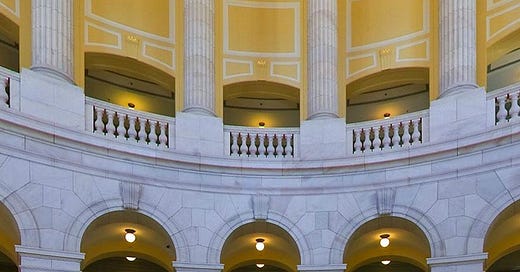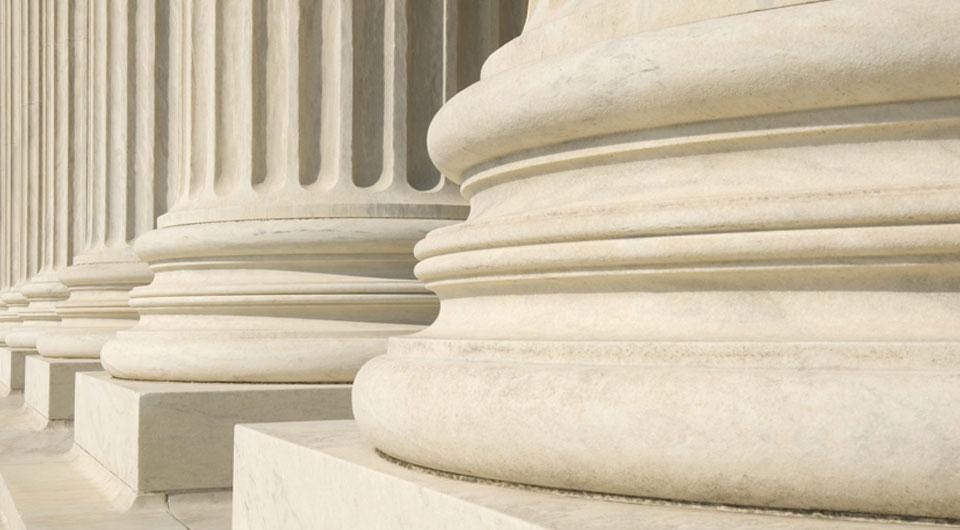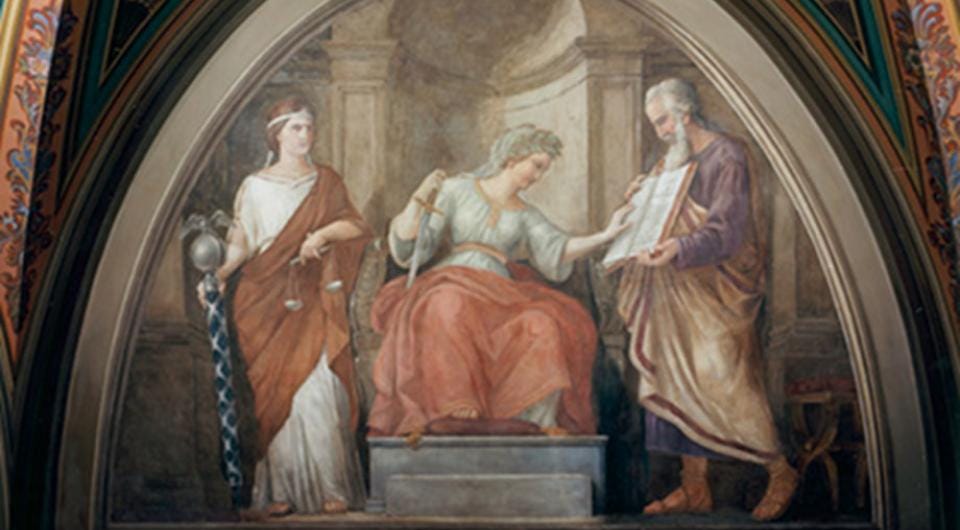#27: CIVICS 101: The Legislative Branch
Q&A #27: What are the duties of the officers and senior officials of the House?
Our American Government
Our American Government is a small book published by the House of Representatives for citizens and those who seek a greater understanding of the American interpretation of democracy. It follows a question-and-answer format and covers a broad range of topics dealing with the three branches of our Government, the electoral process, and the role of political parties.
The Savvy Citizen is reproducing the 169 questions-and-answers through a series of posts called Civics 101. Each post will contain the Q&A as well as some additional commentary to add historical context, fun facts, or anything we believe will add to our collective understanding of these topics.
Think of it as your adult Civics class, but without the test!
Let’s keep at it.
NOTE: Because the answer to this question is lengthy, I’ve added clarifying commentary along the way. My additions are set off in italics and presented in a block quote format, as is this note. All other text comes from the official answer to Question #27 in Our American Government.
SECTION: The Legislative Branch: The Congress
Members, Offices, and Staff
Q&A #27: What are the duties of the officers and senior officials of the House?
The officers and official of the House are, except where noted, elected by the House at the beginning of each Congress. They are the principal managers for the House of essential legislative, financial, administrative, and security functions. Their duties are prescribed in House Rule II and in statutes.
You can download a copy of the complete House Rules below. Rule II begins on page 375!
OFFICERS
Here is the summary of the of duties of the officers of the House (as set forth in our text-Our American Government), each of whom is elected at the beginning of each Congress. Take note that these officers are not elected Members of the House of Representatives themselves.
The Clerk of the House.—The Clerk is the chief legislative officer of the House. After each election, the Clerk receives the credentials of newly elected Members and presides at the opening of each new Congress pending the election of a Speaker. The Clerk keeps the official Journal of House proceedings, certifies all votes, and signs all bills and resolutions that have passed the House. The Clerk’s office supervises the enrollment of legislation which originated in the House, and its presentment to the President. The Clerk’s office also supervises legislative information resources in the House, the page program, and units providing public documents to the press and public.
You can visit the Clerk’s website here.
The Sergeant at Arms.—The Sergeant at Arms is responsible for maintaining order on the floor and in the galleries when the House is in session. The office also maintains security in the House side of the Capitol and in House office buildings and facilities. As part of this responsibility, the House Sergeant at Arms, along with his or her Senate counterpart and the Architect of the Capitol, comprise the Capitol Police Board and the Capitol Guide Board. In addition, the Sergeant at Arms is charged with carrying out Section 5 of Article I of the Constitution, which authorizes the House (and Senate) “to compel the Attendance of absent Members.”
You can visit the Sergeant at Arms’ website here.
The Chaplain.—The House Chaplain opens each daily House session with a prayer and provides pastoral services to House Members, their families, and staff. He/she also arranges for visits by guest chaplains. Traditionally, the Chaplain retains his/her post when party control of the House changes.
You can visit the Chaplain’s website here:
The Chief Administrative Officer (CAO).—The CAO is the principal House officer responsible for the financial management of House of Representatives accounts. Quarterly, his/her office issues a public document identifying all expenditures made by House Members, committees, and officers from appropriated funds at their disposal. The CAO’s office, in addition to its financial management responsibilities, provides a range of services to Member and committee offices, including telecommunications, postal, and computer services, office supply and maintenance services, payroll and accounting services, employee counseling and assistance programs, and supervises private vendors and contractors providing services to the House.
You can visit the CAO’s website here.
OFFICIALS
Here is the summary of the of duties of the officials of the House (as set forth in our text-Our American Government). Unlike officers, officials aren’t elected by the Members of the House, but are appointed in various manners. How each attains an official appointment is described below.
The Inspector General (IG).—The Inspector General is the chief investigative officer of the House. His/her office (either through its own staff or through consultants) conducts periodic audits of House financial and administrative offices and operations. The IG’s findings and recommendations are submitted to the appropriate House offices, to the congressional leadership, and to the House Administration Committee. The IG serves a two-year term and is jointly appointed by the Speaker, the Majority Leader, and the Minority Leader.
You can visit the Inspector General’s website here.
The General Counsel.—The General Counsel is the chief legal advisor to the House, its leaders and officers, and to its Members. The office represents the House, its Members, or employees resulting in litigation resulting from the performance of official duties. The General Counsel is appointed by the Speaker in consultation with a bipartisan legal advisory group, which includes the Majority and Minority leaders.
You can visit the General Counsel’s website here.
The Historian.—By statute, the Office of the Historian acts to preserve the historical records of the House and its Members, to encourage historical research on the House, and to undertake original research and writing on the history of the House. The Historian is appointed by the Speaker. When the post is vacant, other legislative branch organizations and offices may perform some of these services and functions.
You can visit the Historian’s website here.
—-
My Thoughts
In addition to the officers and officials noted above, the House’s official website (house.gov) includes the Parliamentarian of the House among the House officials.
Here’s a summary from the website for the Parliamentarian, which can also be read here.
—
The Office of the Parliamentarian provides the House with nonpartisan guidance on parliamentary rules and procedures. A Parliamentarian has been appointed by the Speaker, without regard to political affiliation, in every Congress since 1927.
Currently, Jason Smith serves as the House Parliamentarian.
Overview of the Office of the Parliamentarian
Parliamentary procedure in the House is governed by a commitment to stand by precedent, known as the principle of stare decisis. This principle ensures that the House conducts business in a consistent and reliable way. The lawyers and clerks in the Office of the Parliamentarian compile the parliamentary precedents that guide the House on questions of legislative procedure.
To ensure the record of precedents stays current, every two years the Parliamentarian publishes the House Rules and Manual, a one volume digest that covers two centuries worth of parliamentary practice in the House [note this link is to an older version of the House Rules than the .pdf I provided above]. The Parliamentarian also publishes the brochure How Our Laws Are Made; the multi-volume Precedents; and a condensed compilation of parliamentary precedent, House Practice.
More About the Office of the Parliamentarian
A Parliamentarian has been appointed by the Speaker in every Congress since 1927. In the 95th Congress the House formally established an Office of the Parliamentarian to be managed by a nonpartisan Parliamentarian appointed by the Speaker (2 U.S.C. 287). The compilation and distribution of the precedents of the House are authorized by law (2 U.S.C. 28 et seq.). The current Parliamentarian is Jason Smith. He succeeds Thomas J. Wickham Jr. (2012-2020), John V. Sullivan (2004-2012), Charles W. Johnson III (1994–2004), William Holmes Brown (1974–1994), and Lewis Deschler (1928–1974).
Constitutional Authority
The parliamentary law of the House of Representatives emanates from the Constitution, specifically Article I, Section 5. These rules include not only the standing rules adopted from Congress to Congress but also Jefferson's Manual. They also include rules enacted as law and special rules adopted from time to time. On this foundation rests a body of precedent established by decisions of presiding officers on actual parliamentary questions or by long custom and tradition.
Nonpartisan
The Parliamentarian is appointed by the Speaker without regard to political affiliation. The Office of the Parliamentarian, and its subsidiary Office of Compilation of Precedents, comprise lawyers and clerks who provide nonpartisan assistance on legislative and parliamentary procedure to the Speaker, presiding officers, and the House.
The Principle of Stare Decisis
The overarching role of the Office of the Parliamentarian is to strive for consistency in parliamentary analysis by attempting to apply pertinent precedent to each procedural question. In resolving questions of order, the Speaker and other presiding officers of the House adhere to the jurisprudential principle of stare decisis—a commitment to stand by earlier decisions. This fidelity to precedent promotes analytic consistency and procedural transparency, and thereby fosters legitimacy in parliamentary practice. The Parliamentarian achieves consistency by fidelity to precedent, and achieves transparency through publication of the precedents. The commitment of the House to stand by its procedural decisions requires rigor concerning what constitutes precedent. In the parliamentary context, the term does not refer to a mere instance in which something occurred or was suffered; rather, it refers to a decision or order actually disposing of a question of order.
Compilation of Precedents
The compilation of the parliamentary precedents of the House is as important as any other function of the Office of the Parliamentarian. For each procedural decision made on the floor of the House, the Parliamentarian extracts the proceedings from the daily Congressional Record and writes a parliamentary syllabus. These “headnotes” must be precise, stating the real substance of the decision and its legal rationale in suitably narrow terms. To ensure a current digest of these matters, the Parliamentarian biennially publishes a House Rules and Manual.
For the longer term, the Parliamentarian compiles the most salient precedents for formal, scholarly publication. These precedents presently fill 27 volumes with 6 indices, comprising thousands of decisions over the years of parliamentary practice in the House. The Office is currently publishing an updated series of precedents, which began in 2018 with the publication of Volume One, and then Volume Two published in October 2019. The most recent release, Volume Three, was published December 2022. Subsequent volumes for this set will be published on a regular basis.
To bridge the span between a digest of decisions and formally published precedents, the Parliamentarian also publishes House Practice, a condensed compilation of procedures of current application.
The Parliamentarian also prepares the brochure entitled How Our Laws Are Made for public distribution.
—
That’ll do it for now … back next time with Q&A #28: What are the duties of the Speaker?
Meanwhile, don’t forget that we’re organizing the post links on a single page available here.
xo,
Kelley for the Savvy Citizen Team
December 18, 2024







